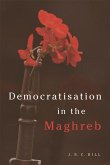"This is a readable, strong book whose authors individually and collectively narrate and contextualize Tunisia's revolution masterfully. Nouri Gana and his co-authors must be applauded. No other text on the Arab World's first revolution matches this book in terms of substance, evidence, intelligence and clarity of purpose and direction. It is a definite must." Larbi Sadiki, specialist on Arab democratization, University of Exeter, Qatar University, Al-Jazeera English Columnist "The Making of the Tunisian Revolution offers an early and impressive appraisal of the roots and results of a revolution that came to alter the political landscape of the Arab world for good." Asef Bayat, the Catherine and Bruce Bastian Professor of Global and Transnational Studies, University of Illinois A unique, timely, and wide-ranging account of the making of the Tunisian revolution and the ensuing transition to democracy Since late 2010, the history of the Arab world has been shot through with insurrection and revolt. Tunisia has become the unlikely birthplace and exemplar of the process of democratization long overdue in the Arab world. Mixing political, historical, economic, social, and cultural analyses and approaches, this volume advances a cohesive and sustained set of reflections on the local, regional, and transnational dynamics as well as the long-term and short-term factors that have combined to set in motion the Tunisian revolution and the Arab uprisings writ large. Above all, The Making of the Tunisian Revolution maps the intertwined genealogies of cultural and social dissent that have contributed to the mobilization of protesters and to the continuation of protests between December 17, 2010 and January 14, 2011 and beyond. The book ends with insightful assessments of the challenges to and the prospects for democratization in postrevolutionary Tunisia. Nouri Gana is an Associate Professor of Comparative Literature & Near Eastern Languages and Cultures at UCLA. He is the author of Signifying Loss: Toward a Poetics of Narrative Mourning (2011) and editor of The Edinburgh Companion to the Arab Novel in English (Edinburgh University Press, 2013). Front cover image: (c) Fethi Belaid/AFP/Getty Images. Back cover image: (c) Yuriy Kirsanov/iStockphoto.com. Cover design: [EUP logo] www.euppublishing.com








